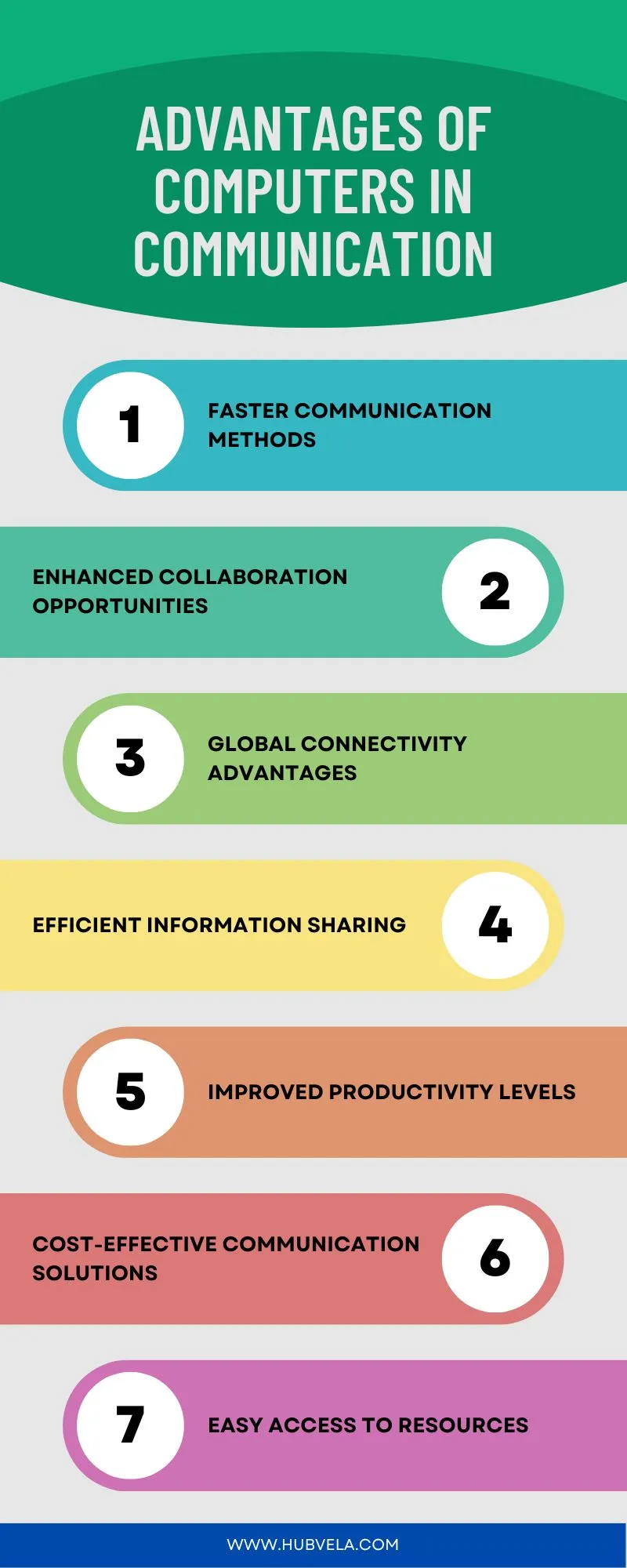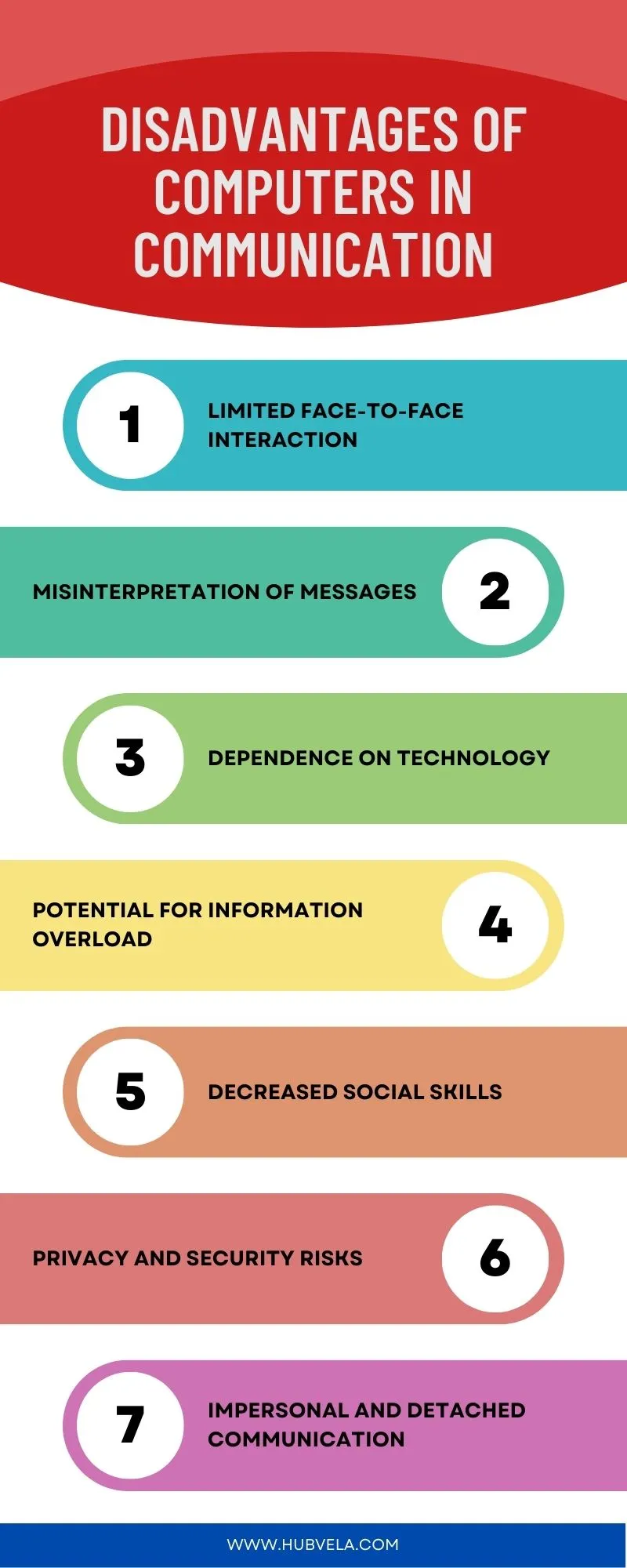Imagine a world without computers. Communication would be slow, limited, and tedious. But with computers, the way we connect and interact has transformed drastically.
In this article, you will explore the advantages and disadvantages of computers in communication.
From faster communication methods and enhanced collaboration opportunities to global connectivity advantages and efficient information sharing, computers have revolutionized the way we communicate.
However, there are drawbacks to consider, such as decreased social skills, privacy and security risks, and impersonal and detached communication.
By understanding both the benefits and drawbacks, you can make informed decisions about how you use computers in your own communication.
So, let’s dive in and explore the world of computers in communication!

--Advertisement--
Advantages of Computers in Communication
Computers have significantly impacted communication, offering numerous advantages that have transformed the way businesses and individuals interact. Some of the key benefits of computer-based communication include:

1. Faster Communication Methods
One advantage of computers in communication is that they enable you to send messages and information faster than traditional methods.
With faster communication methods, such as email, instant messaging, and video conferencing, you can have real-time interactions with people across the globe.
This means that you can communicate and exchange information almost instantaneously, making collaboration and decision-making more efficient. Computers have revolutionized communication by reducing the time it takes to transmit and receive information, allowing for quicker and more effective communication.
2. Enhanced Collaboration Opportunities
With computers, you can collaborate with others more effectively and efficiently, thanks to enhanced collaboration opportunities. Collaborative platforms provide a space where team members can easily communicate, share files, and work on projects together in real-time.
Virtual teamwork allows individuals from different locations to collaborate seamlessly, eliminating the need for physical meetings and saving time. These advancements in computer technology have revolutionized the way we collaborate and have made it easier for teams to work together, regardless of their physical location.
3. Global Connectivity Advantages
By utilizing computers, you can experience the global connectivity advantages of enhanced communication, allowing you to connect with individuals from around the world seamlessly.
Through global networking, computers enable you to communicate with people from different countries and cultures, breaking down geographical barriers.
This opens up opportunities for cultural exchange, where you can learn about different traditions, languages, and perspectives.
Computers have revolutionized communication by making the world a smaller and more interconnected place.
4. Efficient Information Sharing
Enhancing communication, computers facilitate efficient information sharing.
The benefits of using computers in communication include quick dissemination of information, easy access to data, and the ability to share large amounts of information across different platforms. This allows for better collaboration among individuals or teams, leading to increased productivity and streamlined processes.
However, there are also drawbacks to consider, such as the risk of data breaches, information overload, and the potential for miscommunication due to reliance on technology.
5. Improved Productivity Levels
To improve your productivity levels in communication, computers offer numerous advantages.
With computers, you can experience increased efficiency in your work. Tasks that used to take hours can now be completed in a fraction of the time.
Additionally, computers facilitate improved collaboration among team members. With the ability to share documents and communicate in real-time, you can work together seamlessly, regardless of distance.
These advantages ultimately lead to higher productivity levels in your communication efforts.
6. Cost-Effective Communication Solutions
Save money with computers in communication by streamlining your communication processes and reducing unnecessary expenses.
Computers offer cost-effective solutions for remote communication, allowing you to connect with colleagues and clients around the world without the need for costly travel or phone bills.
With email, instant messaging, and video conferencing, you can communicate efficiently and effectively, saving both time and money.
Additionally, digital storage and sharing platforms eliminate the need for physical copies and postage, further reducing costs.
7. Easy Access to Resources
You can easily access resources with computers in communication, frequently improving your efficiency and productivity.
With just a few clicks, you can conduct online research to gather information for your projects or presentations.
Whether you’re a student or a professional, computers enable remote learning, allowing you to access educational materials and attend virtual classes from anywhere in the world.
The availability of resources at your fingertips simplifies the process of acquiring knowledge and expanding your skills.
Disadvantages of Computers in Communication
The use of computers in communication has brought about significant advantages, but it also comes with its own set of disadvantages. Computer technology has revolutionized the way we communicate, making it faster and more convenient.
However, it has also led to various challenges. Some of the key disadvantages of computer-mediated communication include:

1. Limited Face-To-Face Interaction
Using computers for communication can lead to a decrease in direct human interaction. This limited face-to-face interaction can result in decreased human connection and have a negative impact on social relationships.
When people rely heavily on computers for communication, they may miss out on the nuances of nonverbal cues and the personal connection that comes with in-person interactions. This can lead to a sense of isolation and hinder the development of meaningful relationships.
2. Misinterpretation of Messages
One potential disadvantage of computers in communication is the increased likelihood of misinterpreting messages. When communicating through text, it can be difficult to accurately convey tone and emotions, leading to misunderstood intentions.
Additionally, language barriers can further complicate understanding, especially when relying on automated translation tools. Without the benefit of facial expressions, body language, and vocal cues, messages can easily be misinterpreted, causing confusion and potential conflict.
3. Dependence on Technology
Relying heavily on technology can result in a detrimental dependence when it comes to utilizing computers for communication. One major disadvantage is the reduced human interaction that occurs when individuals rely solely on technology for communication. This can lead to feelings of isolation and a lack of genuine connection with others.
Additionally, dependence on technology for communication can be risky, as technical issues can disrupt communication and hinder productivity. It’s important to strike a balance between utilizing technology and maintaining meaningful human interaction.
4. Potential for Information Overload
To avoid overwhelming yourself with an excessive amount of information, it’s important to strike a balance in your use of computers for communication.
While computers provide us with vast amounts of information at our fingertips, this can lead to information overload. This overload can result in cognitive strain, as you try to process and absorb all the information coming your way.
It’s crucial to be mindful of this potential downside and manage your computer usage accordingly.
5. Decreased Social Skills
To avoid a decrease in social skills, it’s important to be mindful of how much you rely on computers for communication. While computers offer convenience and efficiency, they can also lead to decreased social interaction and have a negative impact on relationships.
When we rely too heavily on computers for communication, we miss out on face-to-face interactions and the nuances of non-verbal communication. This can result in a lack of empathy, understanding, and connection with others, ultimately affecting the quality of our relationships.
6. Privacy and Security Risks
By depending excessively on computers for communication, you put yourself at risk for privacy and security breaches, compromising your personal information and sensitive data.
Privacy concerns arise when you share personal details online, as hackers can intercept and misuse this information.
Data breaches are another risk, where unauthorized individuals gain access to your data, potentially leading to identity theft or financial loss.
It’s important to be cautious and take necessary precautions to protect your privacy and security when using computers for communication.
7. Impersonal and Detached Communication
With computers in communication, you may experience impersonal and detached communication. This is because when you communicate through computers, there’s a lack of face-to-face interaction and nonverbal cues, such as body language and tone of voice.
As a result, the communication can feel cold, distant, and less personal. It can be difficult to establish a genuine connection and truly understand the emotions and intentions behind the messages exchanged.
Conclusion on Advantages and Disadvantages of Computers in Communication
As you consider the advantages and disadvantages of computers in communication, it’s important to recognize that they’ve greatly transformed the way we interact and connect with others.
The advantages include increased speed and efficiency, global connectivity, and the ability to store and access vast amounts of information.
However, there are also disadvantages, such as the potential for miscommunication or misunderstanding, the risk of privacy breaches, and the potential for addiction or over-reliance on technology.
Despite these drawbacks, computers have undoubtedly revolutionized communication in numerous ways.


